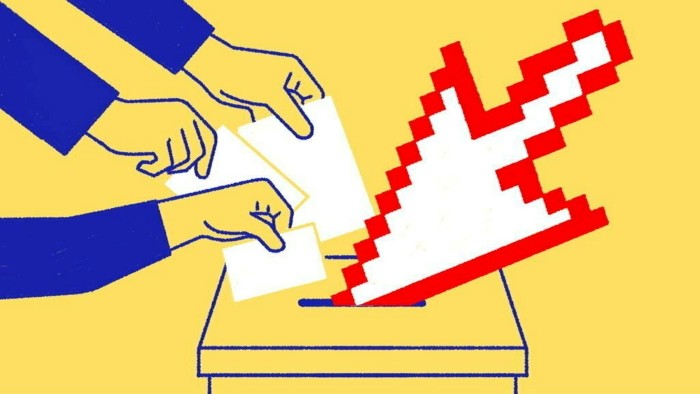The author is a researcher at Stanford University’s Institute for Human-Centered Artificial Intelligence and Cyber Policy Center. She is the author of “The Tech Coup”
Romania shocked the world last month by voting an outsider with ultra-nationalist views as president. Karin Georgescu did poorly in the polls in the weeks before the election. TikTok was integral to his sudden success. It also appears to have been a major facilitator of Russian foreign interference.
The Romanian Constitutional Court then chose to annul the results of the first election. There is a renewed focus on social media platforms and their ability to influence election outcomes. Until now, extraordinary discretion has been given to the companies that manage our information ecosystem, but Romania may change the game.
Suspicious online accounts, opinion polls, and paid influencers who share political content are all considered important online tools for influencing Romania’s vote.
Domestically, intelligence agencies have accused Russia of actively using TikTok to promote Georgescu. The US State Department describes “malicious cyber activity.” In Europe, the Digital Services Act (DSA) has been invoked, requiring TikTok to preserve all data related to European elections for review. TikTok’s representatives emphasized compliance with EU law during a recent hearing in the European Parliament.
After years of questions about the exact impact of social media platforms on democracy, a European study should finally reveal details of the impact of algorithms. Lessons will be learned all over the world.
Most importantly, this is a litmus test for DSA enforcement. The recently enacted law aims to minimize harm by imposing content moderation obligations on large online platforms. This includes mitigating systemic risks such as in electoral processes.
TikTok does not allow political ads and notes that it takes measures against covert influence. However, such corporate rules are not always enforced. Researchers from nonprofit organizations Reset Tech, Check First, and EU DisinfoLab found evidence of joint posts about Georgescu on social media, and found that Meta also failed to enforce its own policies. This “demonstrates that Meta has not complied with the recommendations of the European Commission,” it said. Comply with the DSA.”
New European legislation could challenge the failure of self-regulation. For democracies under attack, avoiding overestimation of disinformation and manipulation, while ensuring that risks are not underestimated, is key to the political and policy response.
Detailed independent research is also critical to promoting public understanding. A society’s resilience to attempts to undermine democracy must be based on facts.
It is clear that our democracy and electoral processes are under attack, from foreign interference to domestically-driven efforts aimed at misleading and polarizing voters.
However, assessing the precise effects and causal relationships remains a challenge for scholars around the world. Companies typically don’t want others to see inside their business and protect sensitive data. The insights gained in the Romanian case will indirectly shed light on any manipulations carried out via social media platforms in other contexts.
Europe’s pursuit of accountability stands in contrast to the United States’ hands-off approach to regulating technology. There, social media platforms are closer than ever to informing Donald Trump’s new tech policies. Elon Musk, a close ally and advisor to the president-elect and owner of Company X, considers any moderation of social media content to be “censorship.” Meta recently said that it believes it has been overly heavy-handed in the past when it comes to moderating certain content.
There’s a lot at stake for TikTok and its owner ByteDance. Under the DSA, the European Commission can impose sanctions of up to 6% of global turnover.
But what happens in Romania will extend beyond a single company. It will challenge the practice of allowing corporate rules to serve as democracy’s greatest defense.
Details about the interaction of Kremlin subversion tactics and social media algorithms are expected to play an important role in ensuring accountability. While Romania has experienced severe political shock due to attacks on its democratic principles, the facts revealed in this election will go a long way in making democracy more resilient and holding tech platforms accountable. It should be.


